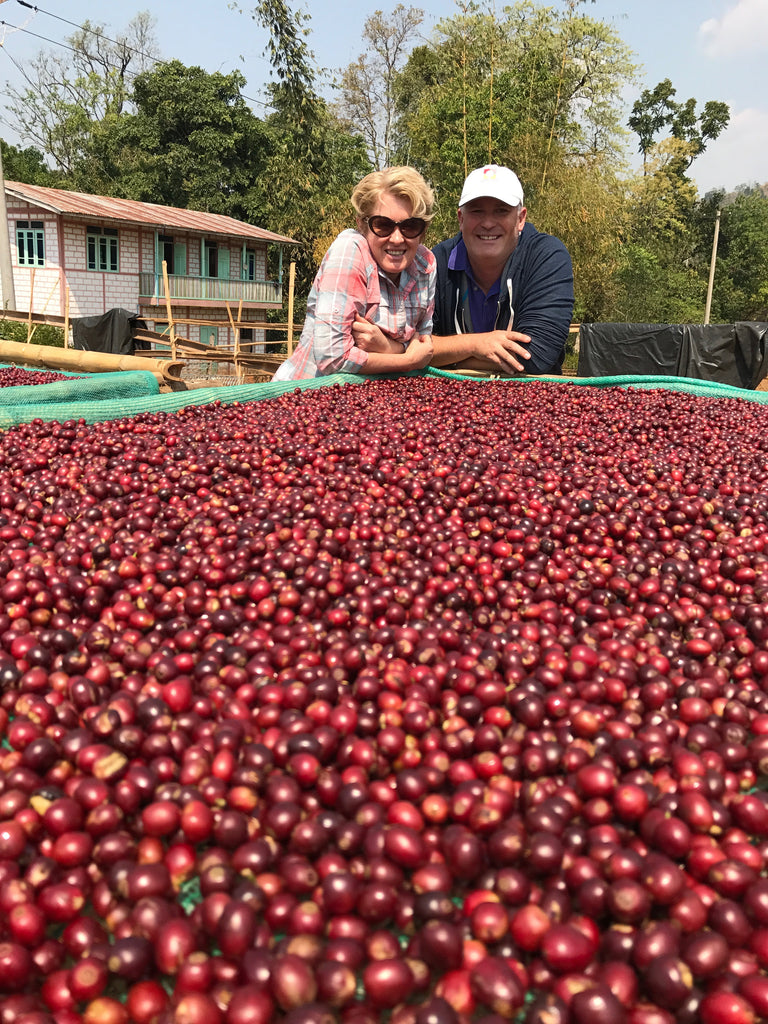Cezve is the name given to the Turkish coffee pot traditionally used to brew individual drinks, usually made of copper or brass. The Greeks use the name Ibrik for the same pot, so the name Cezve / Ibrik recognizes both cultural variations of the same coffee pot. We were first introduced to this incredible brewing method when we were volunteering at the Istanbul Coffee Festival for a friend, Aysin Aydogdu. Fortuitously, Matt and I worked on a stand beside this guy who we heard was famous, Mr Turgay Yildizli; who at the time happened to be the World Cezve / Ibrik Champion. Aysin, was herself a previous World Champion and is a tireless campaigner for this method of preparation. She introduced us to Turgay and the rest so they say, is history. What immediately attracted us to these people and this Cezve / Ibrik method, (apart from the amazing tasting coffee) was that for the first time since entering the world of coffee, we were talking to people who were not only leading the field and passionate about it; but they were happy to share their knowledge. Matt went on to compete and place third in the Worlds the following year, and Karthik won twice the National UAE event before recently winning the 2017 Worlds.
Cezve / Ibrik coffee preparation is a full immersion technique. The coffee is ground fine and added to water, brewed over heat, which is traditionally sand but you can also use small gas burners. Personally my first and second experiences of traditionally brewed Turkish coffees in Jordan, were not pleasant experiences (in fact almost scaring). And don’t get me started on Cardamom as I most definitely do not believe it should be allowed anywhere near coffee unless you are trying to mask bad quality!
We have discovered on our Cezve / Ibrik journey here at Raw, that the same single origins we roast lightly for brewing, make exceptional Cezve / Ibrik coffee. If you haven’t had the luck of trying a good one yet yourself, you really should give it a try.
There are some basic do’s and don’ts that we are going to share now:
- Use good quality beans that have been freshly roasted to a medium or city roast level
- Only grind the coffee just in time (immediately as you prepare the Cezve / Ibrik) the grind size is finer than espresso grind so you need a good quality grinder to achieve the correct grind size
- Weigh the ground coffee, you select the grams by the taste you prefer. Start with 7 or 8 grams added to the Cezve / Ibrik
- Approximately 50 – 60 mls of room temperature filtered water and add this to the freshly ground coffee
- There are different opinions on whether to agitate / stir or not, we have tried many variations but currently we stir the water and coffee
- Place the Cezve / Ibrik on the heat source. This could be a sand burner, which distributes the heat nice and evenly but is slower; or by a gas burner which is faster
- The same principals you follow with espresso or other brewing methods apply here too – there is no fixed recipe that will suit everyone’s pallet, so find your preferred grind size, grams, mls and extraction time and once you find the taste you like, do your best to replicate it consistently using the same recipe
- You will see the coffee develop some colour and a crema on the top, it will rise up the pot, remove from the heat before it spills over. Remember this coffee has boiled, so it is very hot.
- You need to pour the coffee in one smooth motion out of the Cezve / ibrik and into a small cup and let it rest, for at least two minutes to cool down so you don’t burn yourself when you sip. Don’t stir the coffee, allow the sediment to settle and rest and you do not want to drink this. I prefer taking a teaspoon and pushing away the crema, but you can also blow it away.
This little drink is complete, you do not improve it by adding sugar or milk. Quite honestly, we thoroughly recommend it as an incredible way to deliver the true potential of a coffee; its relatively simple and inexpensive to set yourself up at home and it tastes fantastic.

